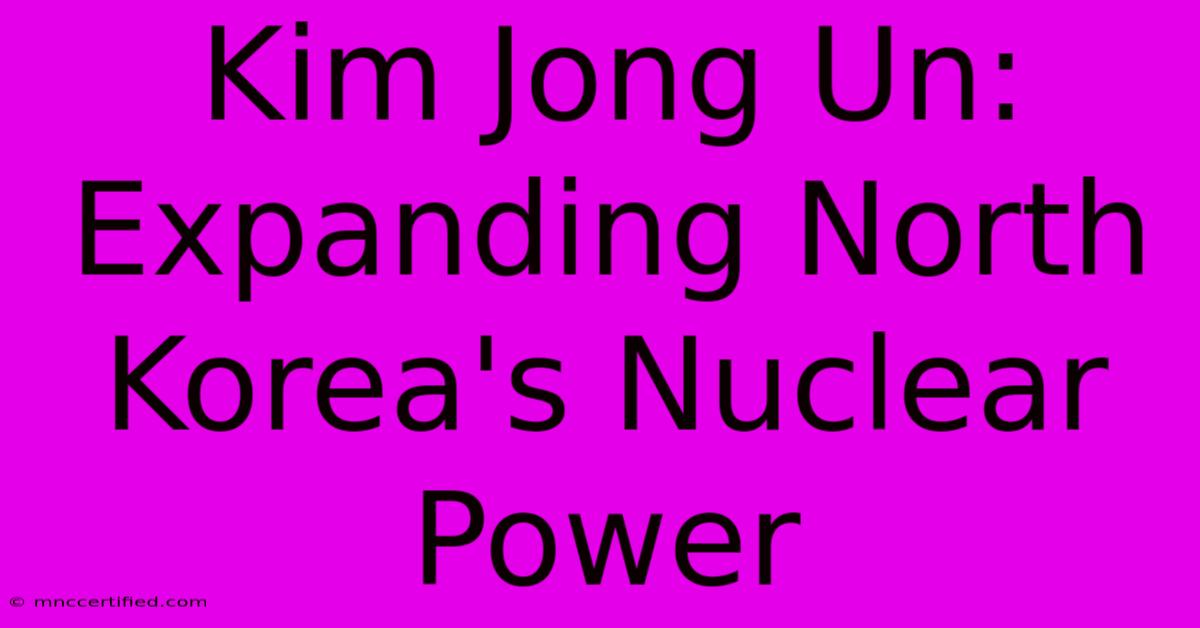Kim Jong Un: Expanding North Korea's Nuclear Power

Table of Contents
Kim Jong Un: Expanding North Korea's Nuclear Power – A Dangerous Escalation
Kim Jong Un's relentless pursuit of nuclear weapons has dramatically escalated tensions on the Korean Peninsula and globally. This article delves into the reasons behind North Korea's nuclear ambitions, the technological advancements under Kim Jong Un's leadership, the international implications, and potential future scenarios.
The Rationale Behind North Korea's Nuclear Program
North Korea's nuclear program is rooted in a complex interplay of factors: security concerns, ideological convictions, and domestic political considerations. Kim Jong Un views nuclear weapons as the ultimate guarantor of regime survival, citing perceived threats from the United States and its allies. This perceived threat, coupled with a deep-seated distrust of the international community, fuels North Korea's determination to possess a credible nuclear deterrent.
Furthermore, the nuclear program serves as a powerful symbol of national pride and self-reliance for the North Korean regime. It showcases technological prowess and reinforces the Kim dynasty's authority, bolstering domestic support amidst widespread economic hardship.
Key Drivers of Nuclear Expansion Under Kim Jong Un:
- Increased testing frequency and sophistication: Under Kim Jong Un, North Korea has dramatically accelerated its nuclear and missile testing, showcasing advancements in both warhead miniaturization and delivery systems.
- Emphasis on ICBM development: The development of intercontinental ballistic missiles (ICBMs) represents a significant leap in North Korea's capabilities, signifying a potential threat to reach the continental United States.
- Diversification of delivery systems: Beyond ICBMs, North Korea is actively developing submarine-launched ballistic missiles (SLBMs) and other delivery systems, enhancing the survivability and unpredictability of its arsenal.
Technological Advancements and Capabilities
North Korea's nuclear program has made significant strides under Kim Jong Un's rule. While precise details remain shrouded in secrecy, evidence suggests advancements in:
- Uranium enrichment: North Korea possesses uranium enrichment capabilities, enabling it to produce fissile material for nuclear weapons independently.
- Plutonium production: The Yongbyon Nuclear Scientific Research Center is believed to be the primary site for plutonium production.
- Miniaturization of warheads: Successfully miniaturizing nuclear warheads is crucial for deploying them on missiles, a capability North Korea has demonstrably achieved.
International Implications and Global Response
North Korea's nuclear advancements have far-reaching international implications, triggering:
- Increased regional instability: The escalating nuclear threat significantly destabilizes the Korean Peninsula and the wider East Asian region.
- Heightened international tensions: North Korea's actions have led to increased tensions between the US, its allies, and North Korea, resulting in frequent diplomatic clashes and sanctions.
- Arms race concerns: North Korea's nuclear progress could spark a regional arms race, with neighboring countries potentially seeking their own nuclear deterrents.
The international community has responded with a combination of sanctions, diplomacy, and military deterrence. However, these efforts have had limited success in curbing North Korea's nuclear ambitions.
Potential Future Scenarios
The future trajectory of North Korea's nuclear program remains uncertain. Several scenarios are possible:
- Continued escalation: North Korea may continue to develop and expand its nuclear arsenal, potentially testing more advanced weapons systems.
- Negotiated freeze or dismantlement: A negotiated agreement could lead to a freeze or even dismantlement of parts of the North Korean arsenal, although the likelihood of this scenario remains low given past failures.
- Accidental or intentional use: The possibility of accidental or intentional use of nuclear weapons, though low, remains a grave concern.
Understanding the complexities of Kim Jong Un's nuclear strategy is crucial for navigating the challenges and risks posed by North Korea's actions. The international community must continue to pursue a multifaceted approach, combining diplomacy, sanctions, and deterrence, while prioritizing regional stability and preventing nuclear proliferation. The consequences of failure are too dire to contemplate.

Thank you for visiting our website wich cover about Kim Jong Un: Expanding North Korea's Nuclear Power. We hope the information provided has been useful to you. Feel free to contact us if you have any questions or need further assistance. See you next time and dont miss to bookmark.
Featured Posts
-
Barry Mc Guigan Gentleman On I M A Celeb
Nov 19, 2024
-
Dallas Slump Continues Texans Triumph
Nov 19, 2024
-
Carrot Recall Nationwide E Coli Risk
Nov 19, 2024
-
Ace Insurance Medicare Supplement
Nov 19, 2024
-
Rare Photo Knox Jolie Pitt Spotted
Nov 19, 2024